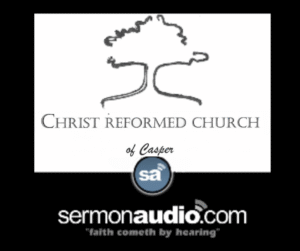LORD’S DAY 13
33. Why is He called God’s “only begotten Son,” since we also are the children of God?
Because Christ alone is the eternal, natural Son of God, but we are children of God by adoption, through grace, for His sake.
[1] Jn. 1:14, 18. [2] Rom. 8:15–17; Eph. 1:5–6; *1 Jn. 3:1.
34. Why do you call Him “our Lord”?
Because not with silver or gold, but with His precious blood, He has redeemed and purchased us, body and soul, from sin and from all the power of the devil, to be His own.
[1] 1 Pet. 1:18–19; 2:9; 1 Cor. 6:20; 7:23; *Acts 2:36; *Tit. 2:14; *Col. 1:14.
Our Lord and Elder Brother
Lord’s Day 13 raises a few issues regarding Jesus’ role in our lives as our Savior, arising from the phrase in the Apostles’ Creed, “only begotten Son, our Lord.” This phrase helps us understand more about who Jesus is, and who we are in relation to Him.
First, we see the utterly unique relation that Jesus has to the Father. He is the only Begotten. He is the Son from all eternity, bearing an intimate relation of love to the Father that did not originate with His humanity but by the very nature of who He is. John 5 in particular shows the unique relationship that the Father has to the Son: “For the Father judges no one, but has committed all judgment to the Son, that all should honor the Son just as they honor the Father. (Joh 5:22-23 NKJ)” The idea that the Son should receive the same kind of honor as the Father is an astounding statement, especially when you remember many Old Testament passages like Isaiah 48:11 where God says, “I will not give my glory to another.”
But we are also called the sons of God. If Jesus’ relationship with the Father is so unique, then what is the meaning of this statement? Ephesians 1:5 tells us we are predestined to the adoption of sons. When people adopt a baby into their family, they commonly regard him as having the same relationship as their biological children. However, Jesus is not only human but also divine, bearing Sonship to God eternally and according to His divine nature, something we can never attain to. So it’s a different relationship. Yet, the glorious and exalted nature of Jesus’ Sonship only amplifies what it means for us to share in that same relationship, though in a lesser way. By the glorious grace of God, we are adopted into His family and share in that exalted sonship.
As question 33 says, this is all for the sake of Christ. It is the love which the Father has for the Son which is extended to all those who are united to Christ by faith. Our relationship with the Father is, therefore, not dependent on our own worth or merit. The Father’s love for us depends entirely on His love for His Son Jesus and our union with Jesus by faith. Then, our worth becomes determined by that love, just as an adopted child often needs to learn the norms and behaviors of his new family, which his new parents will lovingly teach him because he is one of their own now.
Question 34 looks at another aspect of the truth of our union with Christ, that is, that He is our Lord. Jesus purchased us for Himself at the price of His own blood, and we belong to Him now. He has total ownership of us, the power of command, the power of life and death. This is a very good thing, for He is a good master, and the master we belonged to before was Satan, who hated us and owned us only to destroy us. We are so blinded by sin that we think sin is fun and enjoyable and self-affirming, when in fact it is a miserable slavery, as Jesus says, “whoever commits sin is a slave of sin.” (John 8:34) So belonging to the Lordship of Jesus Christ is a very good thing, as He desires only our good.
A life of obedience will naturally flow from that. This answers the question of whether Jesus can be our Savior without being our Lord, and it answers in the negative, for it is by being our Lord that He is our Savior. He saves us by redeeming us from the horrible kingdom of Satan into the Kingdom of God, of marvelous light and peace. Our good works don’t earn us this new state or give us the right to it. Our good works are an aspect of salvation, as we begin to learn to live in ways consistent with what a human being is, in ways that are good and healthy and enable us to enjoy all of the glorious blessings of God’s kingdom.
My wife and I discovered a while back that if our children’s rooms are clean and orderly, then they play with their toys a lot more, since they can find them and have space to enjoy them. Without our guidance, they immediately trash their room, with all their toys and dirty clothes lying around in heaps. They don’t even want to be in their rooms then. But if we help them clean their rooms and teach them how to keep them clean themselves, then they enjoy all their things much more. This is what sanctification is like. In our natural state, we make great filthy heaps of all the good things God gives us. Now that we are in the household of God, by adoption, under Jesus’ Lordship we are reshaped and trained to enable us to properly enjoy all of the beautiful things of God’s creation.
Both of these questions teach us implications of who Jesus is in relation to us- our elder brother in the family of God, and our Lord, who frees us from the miserable slavery of the devil’s kingdom into the joyous blessed kingdom of God.


Comments are closed, but trackbacks and pingbacks are open.